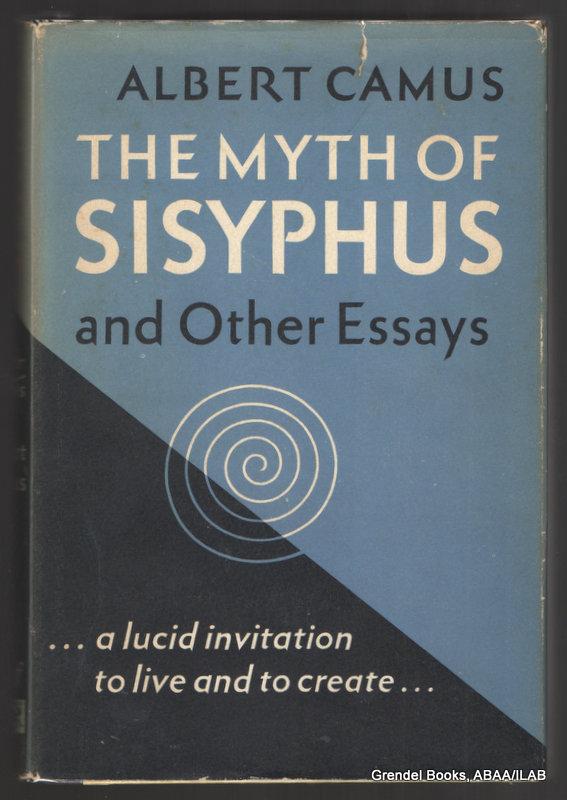
The Myth of Sisyphus [3] A N A B S U R D R E A S O N I N G Absurdity and Suicide HERE is but one truly serious philosophical problem, and that is suicide. Judging whether life is or is not worth living amounts to answering the fundamental question of philosophy. All the rest— whetherFile Size: KB 1 day ago · The story of Sisyphus is so well-known in modern times thanks to Albert Camus, whose essay ‘The Myth of Sisyphus’ () is an important text about the absurdity of modern life (although it’s often described as being ‘Existentialist’, Camus’ essay is actually closer to Absurdism). For Camus, Sisyphus is the poster-boy for Absurdism The Myth of Sisyphus, philosophical essay by Albert Camus, published in French in as Le Mythe de Sisyphe. Published in the same year as Camus’s novel L’Étranger (The Stranger), The Myth of Sisyphus contains a sympathetic analysis of contemporary nihilism and touches on the nature of the absurd. Together the two works established his reputation, and they are often seen as thematically
Essay on The Myth of Sisyphus - Words | Bartleby
The poster-boy of existentialism, Sisyphus has become associated with laborious and pointless tasks, because he was condemned to roll a boulder up a hill, only for the boulder to roll back down to the bottom just as he was about to complete the task. He was thus doomed to repeat this action forever. He was the mythical founder of the city-state of Corinth called Ephyra at the time and was viewed as the successor to Medea — she of the doomed relationship with Jason, of Argonauts fame.
He was also credited with founding the Isthmian games, which were held both the year before and the year after the Olympic Games the second and fourth years of an Olympiadfrom around BC nearly two the myth of sisyphus essay after the first Olympic games were held. Sisyphus is credited with siring, among others, Glaucus, Bellerophon, and even — in one version — wily Odysseus himself.
She conceived Odysseus as a result. But how did Sisyphus end up being condemned to roll a boulder up a hill, for all eternity? That, too, depends on which version of the myth you read. When Zeus made off with Aegina, Sisyphus saw him. Asopus agreed to this, and Sisyphus dropped Zeus right in it. Transported to the Underworld, Sisyphus was condemned to roll a boulder up a hill, for all eternity.
Homer, however, tells the story quite differently. So, Zeus sent Thanatos, the spirit of Death, to carry the stubborn Sisyphus off to the Underworld. But Zeus had underestimated how wily Sisyphus was, and Sisyphus was waiting for Thanatos when he arrived, chained up this deathly agent, and in doing so, suspended death across all of the world. With Thanatos in captivity, nobody — including Sisyphus himself — could die.
But you cannot cheat death forever, and Sisyphus was forced, the myth of sisyphus essay, by Zeus, to unchain Thanatos so that the daily business of death could resume. But once again, Sisyphus tricked his way out of it.
When Sisyphus the myth of sisyphus essay before Hades in the Underworld, he complained that his wife had refused to honour him when he died, and Hades agreed to let him go back and chastise his rude widow. The trick worked, and Sisyphus somehow got away with living for many more years. You really can be too clever for your own good: Sisyphus was. For Camus, Sisyphus is the poster-boy for Absurdism, because he values life over death and wishes to enjoy his existence as much as the myth of sisyphus essay, but is instead thwarted in his aims by being condemned to carry out a the myth of sisyphus essay and pointless task.
Such is the life of modern man: condemned to perform the same futile daily rituals every day, working without fulfilment, the myth of sisyphus essay, with no point or purpose to much of what he does. When Sisyphus sees the stone rolling back down the hill and has to march back down after it, the myth of sisyphus essay, knowing he will have to begin the same process all over again, Camus suggests that Sisyphus would come to realise the absurd truth of his plight, and treat it with appropriate scorn.
He has liberated his own mind by confronting the absurdity of his situation, and can view it with the appropriate contempt and good humour. Indeed, the ancient Greeks knew, as every civilisation worthy of the name has known, that death is an inevitable and even desirable part of life: for people to live forever would be unbearable, a hell on earth, with no room being made for the next generation.
In all the various versions of the myth of Sisyphus, he is not merely cunning a quality we can applaudbut self-interested. He dropped Zeus in it with Asopus, not because he believed it the morally right thing to do, but because there was something in it for him. Image: by Carole Raddato, via Wikimedia Commons. Enter your email address to subscribe to this site the myth of sisyphus essay receive notifications of new posts by email.
Email Address. Interesting Literature is a participant in the Amazon EU Associates Programme, an affiliate advertising programme designed to provide a means for sites to earn advertising fees by linking to Amazon. Share this: Tweet. Like this: Like Loading Leave a Reply Cancel reply. Subscribe via Email Enter your email address to subscribe to this site and receive notifications of new posts by email. Privacy Policy Privacy Policy. Interesting Literature. Copyright © Interesting Literature Designed by WPZOOM.
Write a Comment Email Required Name Required Website. Send to Email Address Your Name Your Email Address Cancel Post was not sent - check your email addresses! Sorry, your blog cannot share posts by email.
[메이킹/∑CAM] 무자막으로 보는 ��스릴 폭발�� 컨퍼런스 씬 크로마키 촬영 현장! - 시지프스 SISYPHUS
, time: 4:11Albert Camus' The Myth of Sisyphus Essays - Words | Bartleby

1 day ago · The story of Sisyphus is so well-known in modern times thanks to Albert Camus, whose essay ‘The Myth of Sisyphus’ () is an important text about the absurdity of modern life (although it’s often described as being ‘Existentialist’, Camus’ essay is actually closer to Absurdism). For Camus, Sisyphus is the poster-boy for Absurdism Albert Camus's Myth of Sisyphus is a philosophical writing based on a Greek Myth of Sisyphus. In this essay, the writer has allegorically presented Sisyphus as the symbol of humankind and his task as the symbol of absurd human existence The Myth of Sisyphus, philosophical essay by Albert Camus, published in French in as Le Mythe de Sisyphe. Published in the same year as Camus’s novel L’Étranger (The Stranger), The Myth of Sisyphus contains a sympathetic analysis of contemporary nihilism and touches on the nature of the absurd. Together the two works established his reputation, and they are often seen as thematically

No comments:
Post a Comment